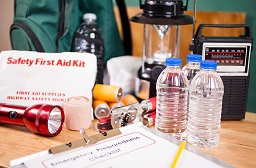What Vaccinations Do I Need Before Going to Costa Rica?
Travel health tips from our medical expert, Dr. Erik McLaughlin MD, plus immunizations you need before traveling to Costa Rica.
 Photo © iStock/Boogich
Photo © iStock/Boogich
Plan ahead for your trip to the tropics with an all-inclusive first aid kit, and check with your doctor to see if you're immunized from these diseases before you go to Costa Rica.
- COVID-19 in Costa Rica
- Before you go
- Hepatitis A
- Hepatitis B
- Typhoid
- Rabies
- Malaria
- Dengue Fever
- Chagas Disease
- Leptospirosis
- Yellow Fever
- Travel medical resources and links
COVID-19 in Costa Rica
For the most up to date information on COVID-19 in Costa Rica, read the statement by Costa Rica's tourism board.
Follow the advice of heatlh authorities and the WHO while traveling. Practice good hygiene, and carry hand sanitizer with you wherever you go. Use a face mask where mandatory, and if you are feeling ill, self-isolate until COVID-19 has been ruled out.
Do not travel against the advice of your government. For the latest information, refer to your government travel advisory.
Before you go
Start evaluating your immunizations at least 8 weeks prior to travel and longer if possible. A very important step and a good place to start this process is by obtaining a copy of your childhood vaccine records.
Most travelers from developed nations have received a primary childhood series of “routine“ immunizations. These immunizations should include protection against measles, mumps, rubella, polio, pneumococcal, H. Influenza, diphtheria, pertussis and varicella (chicken pox). Most travelers under the age of thirty years have also received their vaccine against hepatitis B, as well.
For those without access to their childhood vaccine records, speaking with your doctor well in advance of your trip can allow time for a simple blood test to check for titers. Titers are markers in your blood that indicate immunity against a certain illness and those with previous vaccinations will have high titers, indicating protection. This is a way to confirm if you've had vaccines in the past but do not have records, on paper.
Recommended vaccines for a traveler to Costa Rica include a series to protect against Hepatitis A, Hepatitis B, typhoid and rabies (if you'll have contact with animals).
Hepatitis A
Hepatitis A (liver infection) is a common problem for travelers and should be considered a required immunization. Once you have completed the series of three shots, given 6 months apart, you are considered immune to this for life.
Generally a mild illness in healthy adults, this infection can still ruin a trip and be serious in those with chronic health problems.
Hep. A is generally acquired through a fecal-oral route; meaning improper hygiene. Those visiting less-developed nations used to be the primary concern for this illness, but not anymore. A common story for Hepatitis A is a food worker who hasn't washed their hands and 5-star restaurants can run this risk the same as the road-side food stands.
Hepatitis B
Hepatitis B is another infection that affects the liver but can cause life-long complications.
This viral, liver infection is commonly transmitted through contact with body fluids. Unprotected sex, sharing needles and unsanitary medical equipment are frequent culprits.
Hepatitis B vaccine should be strongly considered by all travelers, regardless of their risks. Once you have completed the three-shot series you are considered immune for life.
Even travelers who do not plan to have unprotected sex or share needles can be at risk. Traffic accidents still represent one of the largest threats to travelers and severe accidents can often land one in the local emergency room. This traumatic injury can lead to a need for transfusion of blood products or at the very least getting an IV/drip. Unfortunately, not all countries screen their blood products well and blood infected with Hep. B may be inadvertently used. Another unfortunate situation that is all too common is the re-use of needles and IV/drips between patients. This is done simply due to a lack of medical supplies.
Typhoid
Typhoid is a bacterial infection (Salmonella Typhi) that is found worldwide but is more common in developing nations. The most common method of infections is through ingestion of contaminated food and/or water. Rash, fever and bloody diarrhea are common symptoms.
An oral, pill form of vaccine is generally the preferred method versus the older injectable version. The series of pills is taken over 5 days and can include some minimal side effects of nausea or headaches. Completion of the series provides protection for up to 5 years.
Unfortunately the typhoid vaccine only provides 40-80% immunity and even those who have completed the vaccine course should exercise caution with their eating habits.
Rabies
Rabies is a viral infection acquired from the bite of an infected mammal. This is a 100% fatal disease if acquired and left untreated. Travelers who are at risk for coming into contact with stray dogs, mammalian wildlife or virtually any animal should consider this vaccine. Children are an especially vulnerable population as their natural curiosity in animals may lead to “trying to pet“ a stray dog and a subsequent bite.
There is currently a world-wide rabies vaccine shortage and this can be difficult to obtain. Most locations are attempting to reserve their supplies for use on those who have already been bitten.
Should any traveler be bitten by an unknown animal they should immediately seek medical care and strongly consider completing a series of injections known as “post-exposure prophylaxis“. Do not delay in seeking treatment as this illness can be rapidly fatal. First aid for a bite includes controlling blood loss and a thorough cleaning with soap and water.
Malaria
Costa Rica is a tropical country and there is a risk of malaria in certain areas. Travelers should speak with their travel health professional about where, exactly, they will be traveling and their personal risk.
Malaria is a mosquito-borne illness and spread through the bite of an infected mosquito. Obviously, limiting exposure to biting mosquitoes is critical in preventing malaria.
The malaria risk areas in Costa Rica generally include Alajuela, Limón, Guanacaste, and Heredia provinces. There is no risk in Limón city (Puerto Limón). This information can change depending on season, rainfall and the unpredictable nature of mosquitoes.
The advised medication for malaria prevention in Costa Rica is chloroquine.
Dengue Fever
Dengue fever is a viral illness spread by the bites of mosquitoes. Typical symptoms are similar to a flu-like illness, often accompanied with a rash. There is no effective vaccine against dengue. A traveler can take steps to prevent dengue fever by avoiding mosquito bites. Read more about Dengue Fever here.
Chagas disease
Chagas disease (American trypanosomiasis) is another insect-borne illness transmitted by the Reduviid bug. In Central America the insect is also known as a “chinche“ bug, although other local nicknames may be commonly used. Primarily an infection associated with rural locations, these insects like to live in poorly constructed houses. Travelers may be at risk should they be visiting these locations and especially if sleeping in these types of “un-improved“ houses.
Victims usually acquire the infection through the bug biting the skin and then defecating while feeding. The person then swats at the bug that is biting them, grinding the insect feces into the freshly made bite-wound. (ewww!)
Most infections are mild and feature fatigue, lymph node swelling and fevers, although 20-30% can have further complications later in life. This infection is diagnosed with a blood test and treated with a special type of antibiotic.
Leptospirosis
Leptospirosis is a microscopic spirochete that affects travelers who come into contact with infected fresh water. Travelers who participate in outdoor sports such as whitewater rafting, kayaking, lake/river swimmers, hikers and bikers who venture off-road are considered at risk.
This organism penetrates skin and often gets some help when infected water is splashed onto skinned or scraped surfaces such as knees or elbows. Adventurous travelers can acquire this from water sources even as small as a puddle because it is spread through infected animal urine. Basically, anywhere an animal may urinate that has water nearby can be risky.
Symptoms of leptospirosis can vary widely, based on over 100 different types of infectious organisms. Common symptoms include muscle aches (especially of the legs), a yellowing of the skin, fever and reddening of the eyes.
Travelers at especially high risk can speak with their travel doc about taking a weekly dose of the antibiotic doxycycline to prevent illness. Doxycycline can promote sunburns and sun sensitivity and may also cause vaginal yeast infections (thrush) in women.
Yellow Fever
There is no yellow fever risk in Costa Rica. Travelers coming in from other countries with yellow fever will be required to show prior immunization, so make sure you plan ahead and have your vaccination certificate on you if traveling from a country where Yellow Fever is a risk.
Travel medical resources and links
These organizations have great websites that list English speaking doctors in the area:
- International Association for Medical Assistance to Travelers (IAMAT)
- International Society of Travel Medicine (ISTM)
- Also, check out the Centre for Disease Control for the latest Costa Rica health advice.
Related articles
Simple and flexible travel insurance
You can buy at home or while traveling, and claim online from anywhere in the world. With 150+ adventure activities covered and 24/7 emergency assistance.
Get a quote


No Comments